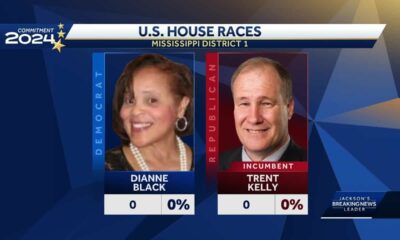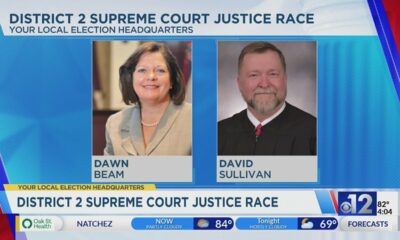Mississippi News
Latest Reeves vetoes could again expand governor’s power
Latest Reeves vetoes could again expand governor’s power
If Gov. Tate Reeves’ recent vetoes of 10 projects throughout the state totaling about $27 million stand, the power of Mississippi’s executive branch of government could again be expanded.
In 2020, the Mississippi Supreme Court expanded the governor’s authority when it upheld two partial vetoes by the governor despite multiple Supreme Court cases dating back to the 1890s that seemed to greatly limit that authority.
The partial vetoes of House Bill 1353 made by Reeves last week could enhance again the governor’s authority.
READ MORE: Gov. Tate Reeves blocks state funding for major Jackson park improvement, planetarium
As Reeves pointed out in his veto message, Section 73 of the Mississippi Constitution states plainly that “the governor may veto parts of any appropriations bill, and approve parts of the same, and the portion approved shall be law.”
Before the 2020 landmark Supreme Court ruling, the high court had said the governor could not veto what are known as conditions and purposes of appropriations bills, but instead had to veto the entire section allocating a sum of money to an agency.
The 2020 ruling allowed the governor to veto those purposes and conditions. Those purposes and conditions in the 2020 vetoes were $2 million for a hospital in Tate County and $6 million for a program to try to combat health care disparities in the state.
This year it appears the governor is again vetoing purposes and conditions of appropriations bills as the Supreme Court in 2020 interpreted the Constitution to allow. But the bill the governor partially vetoed last week — HB1353 — by legislative parlance is not an appropriations bill. It is a general bill, and nowhere in the Constitution is the governor given the authority to partially veto general bills.
“We take the position these vetoes are improper and not permitted under the law. That is something we are going to be looking at,” House Speaker Philip Gunn, R-Clinton, said on WJTV’s Mississippi Insight news program.
Gunn continued: “… I am not aware of any provision under the law that allows the governor to veto partially a general bill. He has to veto all of it or none of it … That may be more than people want to understand but there are differences in the types of bills we have up here.”
The Constitution provides a definition of an appropriations bill. Gunn and others said the bill Reeves partially vetoed does not meet the definition of an appropriations bill. Throughout the legislative process, House Bill 1353 was voted on as if it was a general bill, meaning it had a lower threshold of votes needed to pass.
On the other hand, another Reeves partial veto — $50 million for improvements to the University of Mississippi Medical Center — was in an appropriations bill. The bill is the appropriations bill for the University Medical Center.
READ MORE: Gov. Tate Reeves vetoes $50 million appropriation to UMMC
But whether the Supreme Court justices, whom some observers say displayed a surprising lack of understanding of the legislative process in their 2020 decision, will understand the distinction between general and appropriations bills or even care about the distinction is questionable.
After all, to a “lay person,” HB1353 looks like an appropriations bill. It contains a list of projects throughout the state that received a legislative appropriation.
But Sen. Hob Bryan, D-Amory, who filed and won a lawsuit in the early 1990s challenging the partial veto authority of then-Gov. Kirk Fordice, said the money for the projects was appropriated in another bill that was passed and signed into law earlier by Reeves.
The money was appropriated, from the legislative standpoint, in the appropriations bill for the Department of Finance and Administration into various accounts.
The bill Reeves vetoed simply transfers the already appropriated funds from DFA to the various projects.
“We’re just transferring money from one account to another, or from one purpose to another,” Bryan said. “That is not an appropriation. That is a transfer. I understand that to be what they are arguing and will not be subject to the line item.”
Besides strengthening the governor’s authority, the 2020 ruling also reversed previous rulings that said legislators had “standing” to file a lawsuit challenging the partial veto.
The Supreme Court ruled the lawsuit had to be filed by someone or some entity that had been impacted by the partial veto. For instance, the governmental entities and other involved in the development of the recreational area at LeFleur’s Bluff State Park would have the authority to challenge the governor’s veto of $13 million for that project.
Bryan said the worst part of the 2020 ruling was stripping legislators of the authority to challenge the vetoes.
Bryan said it made sense, both legally and practically, for the Supreme Court to settle the dispute between legislators and the executive over partial vetoes.
“We have a Supreme Court that is liable to do anything completely incompetent,” Bryan said.
READ MORE: Amid vetoes, Gov. Tate Reeves lets pay raises for elected officials pass
This article first appeared on Mississippi Today and is republished here under a Creative Commons license.
Mississippi News
Events happening this weekend in Mississippi: April 25-27
SUMMARY: This weekend in Mississippi (April 25-27) features a variety of events across Central and Pine Belt regions. Highlights include MiraGotSoul at Vibe Studio in Jackson, a community Dinner and Movie in Clinton, and the Natchez Kite Festival. Enjoy live performances with Sweet Lizzy Project in Natchez and the New Bourbon Street Jazz Band in Clinton. Family-friendly activities include the Native Plant Fest and Community Farmers Market in Jackson. In Hattiesburg, catch the Henry Cho tour and the Downtown Crawfish Jam Music Festival. Overall, it’s a weekend full of entertainment, culture, and fun activities for all ages.
The post Events happening this weekend in Mississippi: April 25-27 appeared first on www.wjtv.com
Mississippi News
Events happening this weekend in Mississippi: April 18-20
SUMMARY: This weekend (April 18-20), Mississippi offers a variety of events for all ages. In Jackson, enjoy Food Truck Friday, a jazz concert, free outdoor movie screenings, and multiple exhibitions including “Of Salt and Spirit” and “Hurricane Katrina: Mississippi Remembers.” For family fun, there’s an Easter Egg Hunt at the Ag Museum and “Bunnies & Butterflies” at MCM. Natchez features the Spring Pilgrimage, Lafayette’s 200th anniversary celebration, and a farmers market. In the Pine Belt, highlights include Live at Five, a Spring Candle-Making Workshop, and Easter events at the Hattiesburg Zoo. Don’t miss the Bluff City Block Party and more!
The post Events happening this weekend in Mississippi: April 18-20 appeared first on www.wjtv.com
Mississippi News
Events happening this weekend in Mississippi: April 11-13
SUMMARY: This weekend in Mississippi (April 11-13), enjoy a variety of events across the state. Highlights include the Eudora Welty Birthday Bash in Jackson, Trivia Night at the Mississippi Museum of Natural Science, and Boots & Bling Fundraiser in Natchez. For family fun, check out the Bunny Bonanza in Jackson or the Easter Egg Hunt in Clinton. The Natchez Concours d’Elegance Car Show and Stranger Than Fiction Film Festival offer cultural experiences, while the 12th Annual Dragon Boat Regatta in Ridgeland and the Hub City Classic Car Show in Hattiesburg provide exciting activities for all ages.
The post Events happening this weekend in Mississippi: April 11-13 appeared first on www.wjtv.com
-

 News from the South - Florida News Feed7 days ago
News from the South - Florida News Feed7 days agoJim talks with Rep. Robert Andrade about his investigation into the Hope Florida Foundation
-

 News from the South - Alabama News Feed5 days ago
News from the South - Alabama News Feed5 days agoPrayer Vigil Held for Ronald Dumas Jr., Family Continues to Pray for His Return | April 21, 2025 | N
-

 News from the South - Florida News Feed5 days ago
News from the South - Florida News Feed5 days agoTrump touts manufacturing while undercutting state efforts to help factories
-

 Mississippi Today6 days ago
Mississippi Today6 days ago‘Trainwreck on the horizon’: The costly pains of Mississippi’s small water and sewer systems
-

 News from the South - Texas News Feed6 days ago
News from the South - Texas News Feed6 days agoMeteorologist Chita Craft is tracking a Severe Thunderstorm Warning that's in effect now
-

 News from the South - Arkansas News Feed7 days ago
News from the South - Arkansas News Feed7 days agoAs country grows more polarized, America needs unity, the ‘Oklahoma Standard,’ Bill Clinton says
-

 News from the South - Missouri News Feed23 hours ago
News from the South - Missouri News Feed23 hours agoMissouri lawmakers on the cusp of legalizing housing discrimination
-

 News from the South - Florida News Feed5 days ago
News from the South - Florida News Feed5 days agoFederal report due on Lumbee Tribe of North Carolina’s path to recognition as a tribal nation

















































